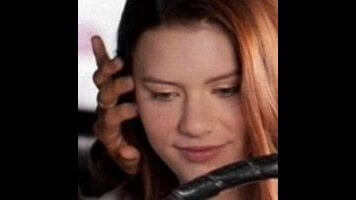My So-Called Life: "The Substitute"

"The Substitute" aka "Oh Captain, My Substitute"
"He's an adult that I can look up to. Finally." —Angela to her parents about the toothpick-chewing, mismatched-sock-wearing, honesty-advocating English teacher, Vic Racine.
When I first saw this episode of MSCL, I had an almost instinctual distaste for it. Granted, at the time, I was a creative writing student at an arts high school who was spending most of her time reading Anne Sexton, John Ciardi, Jim Thompson and others, studying forms, scansion, and meter, and writing based on daily assignments—so I had an aversion to anything that made writing seem like something anyone could do if given an inspirational teacher and a few candles, as well as anything that reduced good creative writing to something that "does better than make sense. It makes you feel." A trope like that was something that we, superior art students that we were, would have called "too sentimental," in addition to "cutesy, banal, synthetic, appalling"—the exact words Mr. Racine used to describe the "domesticated animal" and "greenery"-heavy work of Angela's English class.
In watching the episode now, however, I think my former opinion of it, clouded as it was by heavy doses of art-school superiority, couldn't have been more off. Yes, there is a musty whiff of Dead Poets Society about the episode, and the writing-and-changing-lives montage is more than a little cutesy, but Robin Williams' character in Dead Poets Society is never revealed to be a phony, and a little cutesiness here and there can be forgiven if it's undercut later on. Overall, this episode is a solid, often subtle, and emotionally-complex one—even if it does essentially begin with a English class chaos set to the tune of TLC's "What About Your Friends."
When you first see Vic Racine, substitute teacher, with his toothpick and mismatched socks, telling his students that they can leave if they want to but, "we will be discussing you in your absence," and then dramatically throwing their old work out the window, it's easy to see why high school students would fall for him. He's provocative and cool, so much so that Angela has to tell Rayanne about him, and Rayanne tells Ricky, and pretty soon everyone in the school is sneaking into that English class to worship at the mismatched socks of Vic. He tells them to be honest in their writing. "Don't worry about spelling, or words. Don't make it sound like writing." All of which is fine, but it's hard to talk about honesty so much without coming off like a phony.
The first hint we have of the real Vic, is when we see him sitting under a blackboard that reads, "Question Everything." That command was directed at the viewer as much as it was Vic's students. The second is a few seconds later when Patty, scandalized by the juicy sweetness of "Haiku For Him," comes to see Vic to tell him she won't print the poem in the school's literary magazine. Vic leers at her, half-chewed toothpick in mouth, and says, "[Your husband]'s a lucky man," before calling Graham "fragile." Following a funny ("I sense you're angry? Are you angry?" "Yes." "I sense that.") exchange Patty relents in the interest of "kids who aren't afraid to put their hearts on the page," and agrees to print the Lit.
Of course, that issue of the Lit is only available for the most fleeting of everyone's-reading-it! montages, before the principal confiscates the magazine, essentially outlaws its distribution, and orders Mr. Racine to his office. The next we see of Vic, he's running down the school steps, pausing only to offer a hollow fist-pump to the kids who are yelling his name out of the window. "All that crap about honesty and truth," Brian says back in the classroom, his blond curls shaking with rage, "He didn't even teach." Jordan, poor illiterate Jordan, counters this Vic attack, "Yes he did. He was the best teacher I ever had."
 Keep scrolling for more great stories.
Keep scrolling for more great stories.
